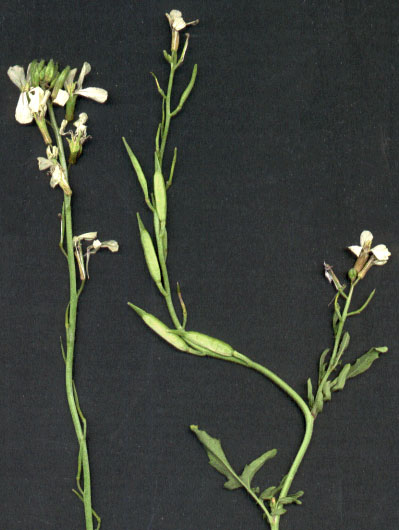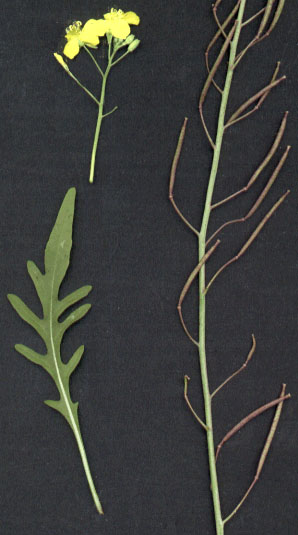The name rocket is used for at least 20 species of herbs, mostly members of the mustard family CRUCIFERÆ (BRASSICACEÆ). These species vary from well known and widely cultivated to obscure and rarely or never grown. They share in common a distinctive zesty or sharp flavor, that is akin to mustard or horseradish. People who relish spicy or hot foods often enjoy rocket. From rocket to rocket the flavor varies. One of these plants is grown mainly for its beauty (Hesperis matronalis); the rest are considered edible salad herbs, wild or cultivated. Below is a list of various plants called rocket.
|
| Corn Rocket (Bunias erucago) |
| Cress Rocket (Carrichteria annua) |
| Dame's Rocket (Hesperis matronalis) |
| Dyer's Rocket (Reseda Luteola) |
| Eastern Rocket (Sisymbrium orientale) |
| French Rocket (Sisymbrium erysimoides) |
| Garden Rocket (Eruca vesicaria ssp. sativa) |
| Garden Rocket (Hesperis matronalis) |
| Hairy Rocket (Erucastrum gallicum) |
| London Rocket (Sisymbrium Irio) |
| Perennial Rocket (Sisymbrium strictissimum) |
| Prairie Rocket (Erysimum asperum) |
| Purple Rocket (Iodanthus pinnatifidus) |
| Salad Rocket (Eruca vesicaria ssp. sativa) |
| Sea Rocket (Cakile spp.) |
| Scented Rocket (Hesperis matronalis) |
| Sky Rocket (Hesperis matronalis) |
| Small-flowered Rocket (Erysimum inconspicuum) |
| Sweet Rocket (Hesperis matronalis) |
| Tall Rocket (Sisymbrium altissimum) |
| Turkish Rocket (Bunias orientalis) |
| Wall Rocket (Diplotaxis tenuifolia) |
| Water Rocket (Rorippa sylvestris) |
| White Rocket (Diplotaxis erucoides) |
| Wild Rocket (Diplotaxis tenuifolia) |
Yellow Rocket (Barbarea vulgaris)
|
| 1. The most familiar of the preceding in terms of current culinary usage is Eruca vesicaria (L.) Cav. ssp. sativa, also called Eruca sativa Mill. One of three species of the genus Eruca, it is an annual from S Europe. In addition to being cultivated in North America it reseeds here, in some cases weedily. It is often called rocket, period, as if it was the only plant with that name. Other names for it include Roquette (French), Rucola (Italian), Rauke (German), Arugula (Italian), Garden Rocket and Salad Rocket. |
| Dark green, notched leaves are prized as salad ingredients because of their pungent odor/flavor. Small creamy-white flowers give rise to plump seedpods. The leaves, flowers and sprouted seeds are eaten. The flowers and leaves taste differently; some people prefer one to the other. This species is well known as an ingredient in salads composed of so called wild greens, derisively termed yuppie chow or rabbit food. Since it is becoming common, I need say no more about it. But I will anyway, to contrast it with the next species to be discussed. If Garden Rocket or Arugula has a flaw, it is this: it is a mere annual, and can bolt (flower earlier than humans prefer), or be frozen by winter cold, or can dry up in searing summer conditions. Hence you may like to know about and try a perennial substitute. |
| 2. Diplotaxis tenuifolia (L.) DC. is one of 27 species of the genus Diplotaxis. The genus includes both annual and perennial members. This species is from Central & South Europe, NW Africa, Crimea, North & West Turkey, Caucasia and West Syria. In English it is called Perennial Wall-Rocket, Narrow-leaved Wall-Mustard, Wild Rocket or Wild Arugula. Various U.S. seed vendors have sold it as Rucola Selvatica --a sort of fake scientific name / Italian name. It has also been offered as Arugula Sylvetta. It is a drought-tolerant, evergreen perennial shrublet, ultimately sort of like a lavender in stature. It makes pure yellow flowers and slender seedpods. In Seattle it is available for eating year-round, and it makes seeds that sprout readily. As with Eruca, it has proved weedy in some locales. I advise growing it in dry, well-drained, sunny places. It tastes hotter than Eruca. |
It has a couple of cousins that are annuals: Diplotaxis erucoides (L.) DC. bears white flowers; Diplotaxis muralis (L.) DC. bears yellow flowers. I have neither grown nor tasted either.
Back
|

Eruca scan by ALJ
|

Diplotaxis scan by ALJ |

